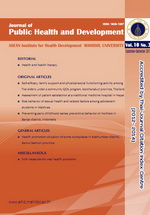Factors affecting preventive behavior of tuberculosis among the family members in Magway district, Magway Region, Myanmar.
Main Article Content
Abstract
This descriptive study was conducted to determine the factors affecting preventive behavior of tuberculosis among the family members in Magway district, Magway Region, Myanmar. Multistage sampling technique was used to obtain the data from 370 family members of tuberculosis patient household by the structured questionnaire. Univariate analysis was used to describe descriptive statistics of each independent and dependent variables. Chi-square test and multiple logistic regression were used to determine factors associated with TB preventive behavior.
The results found that the average age of family members of TB patient household was 43 years with the range of 18 -65 years and the marital status were currently married. Most of respondents had finished primary school and middle school 45.1% and 23.5% respectively. Three fourth of respondents were farmers and respondents who don’t have job and 59.7% got less than or equal one hundred thousand kyats. Nuclear family type were 79.7% so over two-third of respondent family had less than or equal 5 members. Only 14.9% of respondent household had more than two TB patients. The most had duty to take care TB patient in their family (85.7%). Only 14.6% and 15.7% of respondents had good knowledge and good perception on tuberculosis prevention. There had 59.2% of respondents having good TB preventive behavior. Regarding the Chi-square test, knowledge level was found to be significantly associated with TB preventive behavior. After adjusting with other variables, knowledge level and monthly family income became significant predictors of TB preventive behavior (OR= 7.594, 95% CI = 2.588 – 22.021 for knowledge level and OR= 1.853, 95% CI = 1.160 - 2.960 for monthly family income).
This study suggested that health education programme in media sector and collaboration and coordination with supportive agencies should be extended to improve knowledge and socio-economic welfare of community for changing TB preventive behavior.


